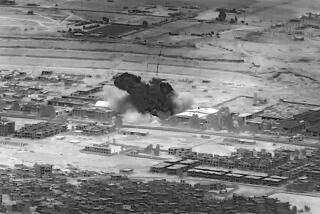A TOWN GIVES UNTIL IT HURTS
- Share via
BOONE, Iowa — The yellow ribbons tied around the trees along Mamie Eisenhower Avenue have faded to white, the “Support Our Troops” signs are frayed with age, and all Tamera Dahl sees is a war with no end.
More than a year ago, the town gathered to salute the National Guard troops -- hundreds of local men and women -- called to duty. In the crowd were two of Dahl’s cousins, who ended up in the Middle East.
They left in groups after parades and parties, with promises of returning home before the farmers had finished their harvests. But for some, the yearlong tours have stretched out indefinitely. Others came back for a few months, only to have the military call them back. The rolling hills have already been tilled for winter.
And the deployments continue. Last month, 40 troops were sent off, including Dahl’s husband, Sgt. 1st Class Allen Dahl, an Army intelligence specialist. Just this week, another five left, headed overseas.
They are part of the Pentagon’s increasing reliance on citizen soldiers for the Middle East and elsewhere, and will soon be joined by the 43,000 reservists and National Guard troops throughout the country who were put on alert this week.
Of the nearly 500 National Guard troops from the dozen units here, only 150 are home. The town feels the absence -- it has fewer volunteer firefighters, real estate agents, grocery clerks, baby-sitters and state troopers.
“Almost everyone’s already gone,” said Tamera Dahl, formerly a private first class with the Iowa National Guard. “Who else can they take?”
Though President Bush declared major combat in the war in Iraq over May 1, the conflict in the Middle East continues to roil through towns like Boone. Each fresh report of casualties tests the patience of residents, who say they are sacrificing too many of their neighbors and loved ones to military campaigns.
That sense of frustration was heightened by fear and sorrow this week when 16 U.S. soldiers were killed Sunday in an attack on a Chinook helicopter. Many in Boone knew the dead. Some had trained at the Iowa National Guard’s armory along the edge of town, including Chief Warrant Officer Bruce A. Smith of West Liberty, Iowa, one of the helicopter’s pilots, and Sgt. Paul F. Fisher of Marion, the flight’s engineer.
Boone grieved for them. And the townsfolk feared for their loved ones still overseas.
“Every time someone dies, I immediately pray that it’s not one of ours,” said Chief Warrant Officer 4 Craig L. Nida, a readiness officer in Boone and a good friend of Smith’s. “Most people who joined the National Guard expected to give six months, maybe a year, of their lives for their country. Not two years. Not more. They never expected this kind of combat.”
Though the town speaks proudly of its troops, residents say there is a growing sense of weariness. If the war continues, will the nation still support the troops? Or will their loyalties fade like the yellow ribbons that still cling to the town’s oak trees?
“In public, everyone’s really positive. But everyone was really positive about Vietnam too,” said Marge Wilson, 45, the town’s deputy sheriff, who was in the National Guard for 21 years. “In private, people aren’t supporting the reasons why we’re still [in Iraq].”
The National Guard here dates back to the 19th century, when scores of farmers and townsfolk volunteered to fight in the Spanish-American War.
Named after the son of explorer and Army Col. Daniel Boone, military officials say Boone has always had a National Guard presence that is disproportionate to its population of nearly 13,000.
There are almost as many people in the National Guard in Boone as there are in the state’s second-largest city, Cedar Rapids, which has about nine times the population.
The National Guard troops here specialize in aviation. Its helicopter pilots, crews and maintenance teams are highly regarded.
“The Boone units are known for being fast, steady and reliable,” said Col. Robert King, public affairs officer for the Iowa National Guard at Camp Dodge outside Des Moines. “It’s part of the reason why it’s a ghost town there right now.”
For the National Guard troops from Boone, the war is not just in Iraq. It’s in Afghanistan, where aircrews from here are helping support Army troops. It’s in Bosnia and South Korea, where local National Guard troops are replacing military teams, some of which are heading to the Middle East.
They are stationed everywhere but home, a rarity for those used to their safe, civilian world. The Guard troops were last called up in 1990 for the Gulf War and in 1993 for the state floods.
“The United States is beyond the limit of size for a military to still maintain the kind of foreign policy we have,” said John Lynn, a history professor at the University of Illinois and president of the U.S. Commission on Military History. “We’ve downsized our forces since the end of the Cold War, and have continued to do that all these years.”
Because of that, said Lynn, what started out as a state army for the governors has become a pool of soldiers needed to fill the military’s gaps.
“You can’t fight a war these days without mobilizing the Guard,” Lynn said. “And you can’t fight it without calling on them again and again.”
As of Wednesday, more than 154,000 National Guard troops and reservists had been called into active duty. Nearly 60,000 of them are in Iraq or Kuwait.
The Pentagon says it has tried to limit repeat calls to arms among the National Guard forces, but the need for military support in Iraq and elsewhere has required the military to rely on the country’s homeland forces.
That’s little comfort to Boone residents like Linda Blank. Last December, she tearfully watched as her daughter Terri Jones posted two calendars on the wall.
In the 2002 calendar, the 31-year-old homemaker showed her two young daughters when “Daddy was leaving to play Army,” she said. On the 2003 calendar, she flipped to the December page and marked when her husband, Matthew Jones, a National Guard aviation machinist, would return.
“We had to take down the 2003 calendar, because we’re not sure when Matt’s going to be able to come back,” said Blank, who manages the Super 8 Motel here. “He said maybe next year he can come home.”
As the war in Iraq drags on, some people are beginning to wonder whether the government should reenact the national draft.
Inside the Veterans of Foreign Wars clubhouse, elderly men hunch over cans of Budweiser, watching television. As footage of the Chinook helicopter crash rolls on, retired Lt. Col. Robert Forney glares at the screen.
Long ago, the onetime Army Air Corps pilot joined the National Guard in Boone. Forney became an aviation battalion commander, and was once in charge of the Davenport unit that was involved in the Chinook crash.
“I know it’s political suicide for a president to reinstate the draft, but I don’t care,” said Forney, 80. “The military’s spread too thin, and it’s not fair that the National Guard should be forced to carry the ball. It’s not fair that small towns like Boone should have so many people gone for so long.”
For Staff Sgt. Donald Anderson, the thought of repeat tours was just too much.
Anderson was in the National Guard for 20 years before he was called up in late 2001 after the terrorist attacks on the U.S. He was part of D Company 1-109th, which handles maintenance on Blackhawk helicopters and other equipment.
A year later, the Boone native came home. He immediately retired from the National Guard.
“I thought I’d better get out when I could,” said Anderson, 48, an assistant police chief for the Boone Police Department. “I miss the people. I don’t miss being activated.”
Anderson’s reasons for leaving the Guard are shared by a growing number of other citizen soldiers from Boone, said Chief Warrant Officer Nida.
“I wrote to one guy in Iraq who was interested in flight training and becoming a pilot,” Nida said. “He wrote back saying no, that he’d put his life on hold and in danger for long enough.”
More to Read
Sign up for Essential California
The most important California stories and recommendations in your inbox every morning.
You may occasionally receive promotional content from the Los Angeles Times.













